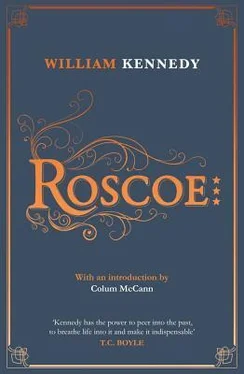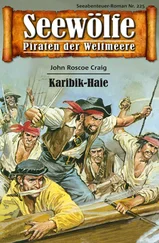She saw the shack and dock and lake, which Gilby had not yet outgrown but would now think of as no longer his. It is yours, Gilby, and I’ll see you keep it. She wanted to find him on the dock but he wasn’t in sight. She turned onto another trail, seeing him ahead of her, then not. She stopped and listened for him, heard the rustling breath of the forest, the breath of her horse, but no sound of her boy. She had lost him. No, she would never lose him. He was gone. No, not gone. Gone. Never.
She came slowly back to the stables. Ticky was feeding the horses alfalfa and bran, and the shredded beet pulp. She stabled Mr. Bantry and looked toward the woods for Gilby. She saw Roscoe coming out of the house, and the sight of him was tonic. Things would change now.
Then here came Gilby, riding across the west pasture. He swung himself out of the saddle, and she was again struck by his resemblance to Elisha: lean and lanky and growing taller, and that same resolute jaw. His straight black hair blown wild, and those black eyes. Yusupov also had dark features. But from Gilby’s boyhood, Veronica suspected Elisha, not Yusupov, was his father. She hinted this once to Roscoe, who explained that children grow up to look like the people they live with, and so do bulldogs.
“So you come back,” Ticky said as Gilby walked Jazz Baby to the hose bib outside the stable. “You gonna stay awhile?”
Gilby did not answer.
“Aren’t you going to talk to us?” Veronica asked.
Gilby did not answer, or look at her.
“What ails you, boy, you don’t talk to your mama?” Ticky said. “Where you get off on that?”
Gilby looped Jazz Baby’s reins over the rail fence and took off his saddle. He filled a bucket with water from the hose, and washed the horse with a sponge.
“Lookit this boy don’t talk to his mama. What kind of boy is that?”
“I don’t have anything to say,” Gilby said softly.
“You got a whole lot to say you ain’t sayin’.”
Gilby washed Jazz Baby’s nose and whispered to the horse.
“Boy talks to his horse but don’t talk to his mama.”
“It’s all right, Ticky,” Veronica said, “he’ll talk when he’s ready.”
“I did that with my mama,” Ticky said, “my papa’d say, You don’t wanna talk to peoples you get outa this house go live with that horse.”
“I can do that,” Gilby said.
“He can do that,” Ticky said. “He can live with Jazz Baby, and Jazz Baby gonna cook breakfast for him. Jazz Baby gonna buy his shirts. Hey, Roscoe, you know this boy here don’t talk to his mama, he gonna live with his horse.”
Roscoe nodded to Ticky, touched Veronica hello on the shoulder.
“You believe in horses, is that it?” Roscoe said to Gilby.
Gilby dropped the sponge into the bucket, took the scraper off its nail, and scraped water off Jazz Baby’s flanks, shoulders, and haunches.
“Do you know how stupid horses are?” Roscoe said.
“They’re not stupid,” Gilby said, scraping the haunches.
“Stupider than crabmeat,” Roscoe said.
“Horses are smart,” Gilby said, scraping faster.
“Gimme that scraper,” Ticky said. “You gonna skin that horse.”
“Don’t tell me how smart horses are,” Roscoe said. “They tell too many lies.”
“Horses don’t lie,” Gilby said.
“Are you serious? There’s a broken horse for every light on Broadway. You ever try to hide a tennis ball in a horse’s ear? You can’t do it. On the other hand, I never met a horse I didn’t like.”
“Me either,” said Gilby with a tight-lipped smile.
“Why do you want to live with your horse?”
“Nobody tells me anything.”
“You mean that stuff in the Sentinel about the lawsuit?”
Gilby nodded.
“That’s how you learn. You read the papers. You know you’ll need a lawyer to fight this thing in court. You have any lawyer friends?”
“No.”
“Sure you do. Me.”
“Are you a lawyer?”
“I’m your lawyer. Your mother hired me.”
“When?”
“This morning.”
“She didn’t tell me that.”
“We don’t tell you everything all at once. We parcel it out. We ever tell you about Einstein’s theory that light curves with gravity? We ever tell you how John Calvin tried to cancel Sunday baseball?”
“Nobody even told me where I was born.”
“San Juan, Puerto Rico. I was there.”
“You were? Where’s Puerto Rico?”
“Down there in the middle of it all. It was a very hot day. Bright and sunny, the trade winds blowing in off the Atlantic, palm trees, sandy beach, whitecaps on the ocean. You were very good-looking when you were born. You looked like a pineapple. We brought you back here in your father’s airplane right after you left the clinic with whatsername.”
“Aunt Pamela?”
“That’s the one,” Roscoe said.
“Why does she want me? She doesn’t even like me.”
“I don’t know anybody she does like. She wants money and needs you to get at it, even though she couldn’t wait to get rid of you. But your parents loved you and wanted you even before you were born.”
“What’s my real name?”
“Gilbert David Fitzgibbon, as always. A stately name.”
“What’s stately?”
“Dignified, magnificent. Don’t let anybody change it.”
“Me and Alex have the same name, but he’s not my brother.”
“He’ll always be your brother.”
“He’s my cousin.”
“Then he’s your brother-cousin. Do you love him?”
“I guess so.”
“No guesses. Do you love him, yes or no?”
“Yes. But my father’s not my father.”
“No, of course not.”
Roscoe took off his hat and coat, handed them to Veronica, and rolled up his shirtsleeves. He tipped over a bale of hay and stood on it, took Jazz Baby’s reins, threw his right leg up, and mounted the horse.
“You gonna ride him?” Gilby asked.
“I might.”
“I didn’t know you could ride. You don’t have a saddle.”
“I used to ride bareback in rodeos. I was in ten or fifteen rodeos, one after the other.”
“You were never in the rodeo.”
“Well, you’re right, but your father and I rode bareback plenty down in Texas. They all ride bareback down there.”
“My father didn’t ride.”
“He gave you a pony, didn’t he?”
“Yes.”
“And when you outgrew it he gave you a horse.”
“Yes.”
“But he wasn’t much of a father, because he never rode a horse, right? And he never took you fishing, never took you to New York to see the lights of Times Square, never introduced you to Jack Dempsey, never gave you a bicycle or started a bank account so you’d have your own money, never sent you to one of the greatest schools in town, never taught you how to throw a baseball and a horseshoe, never took you down to Hyde Park so you could shake hands with the President, never let you sleep with him and your mother when burglars were coming up through the steam pipes, never took you to Laurel-and-Hardy movies and bought you White Tower hamburgers, but, hey, we all know he whipped you with his riding whip so you’d bleed all over the bed. We also know he woke up every day of your life and talked to you about something important. I know, because I was in on a whole lot of those breakfast conversations. Can you possibly imagine how much your father shaped who you are? And you say he’s not your father? Baloney gravy, kid. Who else would’ve done those things for you?”
Gilby looked at his mother and at Ticky, who kept nodding his head. Gilby wanted to say his father shouldn’t have tricked him, but the image arrived of Elisha pitching a horseshoe. Before Gilby could answer him, Roscoe moved Jazz Baby forward and, when he was in open pasture, rode him at a canter, then into a gallop, across the whole pasture to the woods, and then galloped back to the stable and slid gracefully off the horse’s back, doubling over in pain.
Читать дальше












